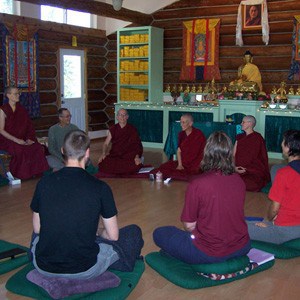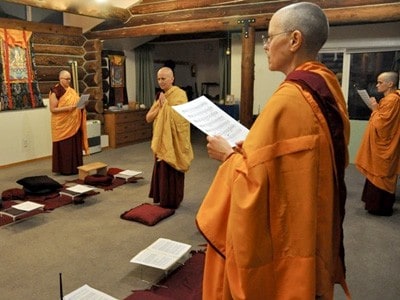Equalizing and exchanging self and others
Equalizing and exchanging self and others
- Second method for generating bodhicitta
- Seeing the kindness of all sentient beings
- We are totally dependent on others for what we have and what we know
- We benefit from the work of others, whether or not they intend to benefit us specifically
The other day I was talking about dependent arising in a situation generating bodhicitta and that the two factors that we want to really focus on for developing great compassion is first of all seeing sentient beings’ suffering, and that doesn’t just mean the ouch suffering; it means their situation of being in cyclic existence. And then, developing the awareness of their kindness to us so we react kind of automatically with the feeling of love and compassion and care and concern for them.
One way to develop that feeling of their kindness—an awareness of their kindness—was through recognizing all beings as having been our parents and then the kindness of our parents. That’s what we talked about before. Today, I thought I would mention a little bit about the kindness of others when you develop it through the method of equalizing and exchanging self and others. Because here we think of our total interdependency with sentient beings and how everything we have, everything we know, comes through the kindness of others. It’s not just that when we were born and totally helpless our parents took care of us, but it was also our teachers taught us. So all this knowledge that we’re sometimes a little bit proud that we have, if we were to look at it, it came from the people who taught it to us. And any skills we have, again, they aren’t ours inherently. The skills we have, the talents we have, came because people encouraged them, people taught us how. And so, when we look at all of our ability just to function in the world it all comes because of the kindness of sentient beings. Just our ability to sit here and talk to each other, because when we were born none of us knew how to speak, yes? And if it weren’t for the kindness of other beings teaching us how to speak, we wouldn’t know how to speak. We have this building to live in, and without the kindness of the architect and engineers and the construction people and everybody else we wouldn’t have this building to use. Anything we look at. If we look at the clothes we wear, the carpeting, anything that’s around, it all came due to the efforts of others. And so, to see them as kind in that way and ourselves as beneficiaries of their kindness.
And then some people always go: “But, but, but, they didn’t have the motivation to be kind to me they were just doing their job in the world. My teachers were just teaching because they needed a job. And the contractor and the architect and the construction workers and the plumber, they just needed a job and they had no care and concern for me, so how is that kindness?” Well, that’s especially why it’s kindness, why we go to see their kindness, because it’s not about us, it’s not about somebody specifically kind to me because they’re attached to me, therefore they’re kind. Instead, we’re really opening our mind more just to how we benefit from living in the world with other beings and how they come through for us on so many levels. And that is not about us personally, yes? So, it’s a different way of thinking. Because even in the method when we’re considering all sentient beings as having been our parents, and their kindness as our parents, there’s still a bit of me in there, you know? They’ve been my parents and been kind to me as my parents. In this other method we’re thinking about the people at the PUD department who give us electricity; we don’t know them. They’re not thinking “Oh, I want to be kind to people at Sravasti Abbey today”, but, the point is that through their labors and their efforts we benefit. And just by the fact that we benefit, whether it’s about us as the center of the world or not, just by the fact that we benefit from other people’s energies and efforts, that means they’ve been kind and that we’ve received kindness.
So this second method is a little bit harder because we have to open our mind to a broader view and really see how we’re interdependent and how everything really depends on the kindness of others, and how we wouldn’t be able to practice the Dharma now without the kindness of all the people who brought us to the point where we are right now in this life. And that includes the janitors at our elementary school, because we could not have gone to the elementary school if there weren’t janitors there, yes? So it really opens us up to the kindness of so many beings. And then, of course, when we habituate ourselves with seeing that again and again and again, then our whole take on the world changes. Because then, instead of driving along the highway and going: “God! Why are they having a construction project now, right when I need to go by here? Why don’t they fix the highway at two o’clock in the night, when I’m not here?” You know, instead of thinking like that, which is what we usually think, we think: “Wow! There’s going to be a highway for me to drive on because these people are out in the burning sun working on it. How kind they are!” It really changes our whole way of relating to people, and we no longer look at them as just objects to bump into, but as living beings with feelings who we have received kindness from, okay? And automatically from there, then we want to repay that kindness, yes, and love and compassion come.
Venerable Thubten Chodron
Venerable Chodron emphasizes the practical application of Buddha’s teachings in our daily lives and is especially skilled at explaining them in ways easily understood and practiced by Westerners. She is well known for her warm, humorous, and lucid teachings. She was ordained as a Buddhist nun in 1977 by Kyabje Ling Rinpoche in Dharamsala, India, and in 1986 she received bhikshuni (full) ordination in Taiwan. Read her full bio.


